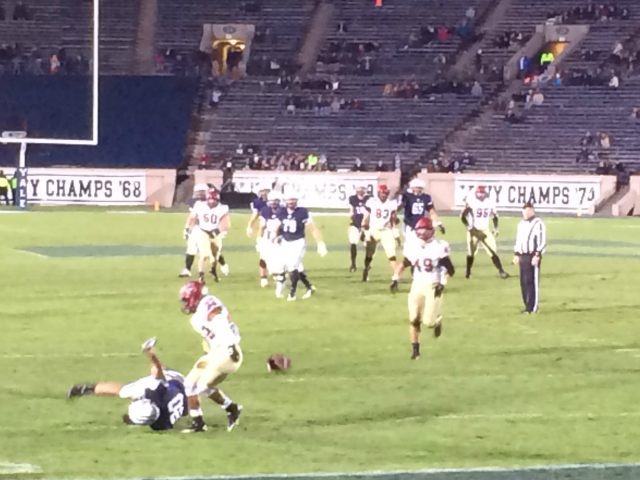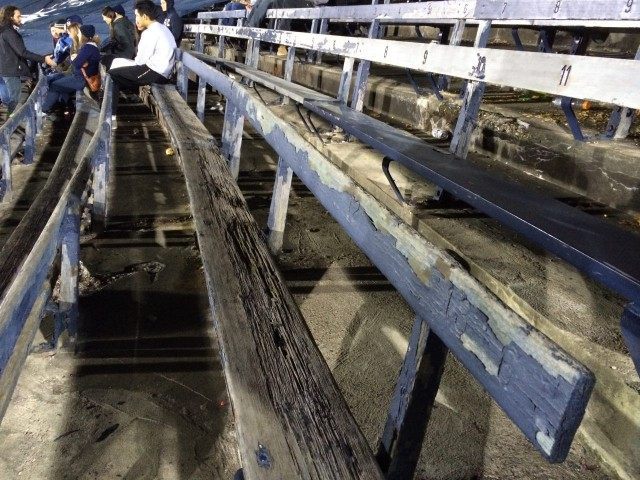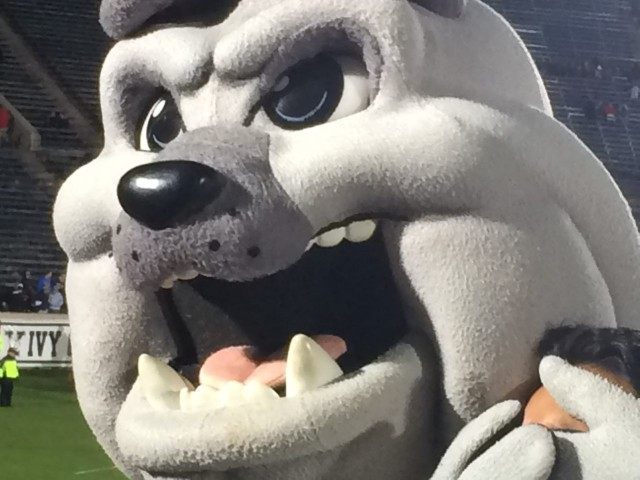NEW HAVEN, Conn.—Harvard rolled Yale 38-19 on Saturday. The victory marks the Crimson’s ninth in a row over the Bulldogs and gives them a share of the Ivy League title for the third straight season.
Morgan Roberts looked like a Walter Camp All-American throwing for 410 yards for the Bulldogs. Yale split end Christopher Williams-Lopez looked all-world with 169 yards receiving and a touchdown. The Bulldogs nevertheless experienced an unbefitting albeit familiar outcome for the squad that essentially invented the game of football. Yale scored early and late but Harvard frequently found the end zone in between.
The Only Game That Matters still matters for Yalies as a halftime show, as a tailgating party, as a day for Handsome Dan to come out of his kennel, as the cause to remove the coonskin coat from the mothballs, and as an excuse for the student section to disrobe in the fourth quarter. As a game it matters not much. One group of students expressed this sentiment on Saturday in an Ivy League way by holding up a banner that read, “Whoever Wins, Our Lives Will All End Equally in Death.”
Boola, boola?
It wasn’t always so. Harvard took their ball and went home for the 1885 season after Yale crushed them 52-0 to close the previous campaign. A crimson-faced Crimson pulled the same baby act after losing 12-4 in 1894. The Cantabrigians’ frustration with an inability to beat the Elis at football nudged them to change football. The flying wedge, the forward pass, the prolate spheroid replacing the round foot-ball still used in European football, and sensibly picking up the kick ball and running with it all derived in part from Harvard’s burning desire to beat their Connecticut competitors if not at their own game then at least at some altered version of it. Certainly Harvard President Charles Eliot’s push to ban the sport during the 1905 season received encouragement from the discouragement of his school winning just four of the 26 contests between the rivals through that season.
Times, as the New Haven Clock Company’s Chairman of the Board Walter Camp understood, change. The new century sees Yale one for fifteen in tries against their ancient rival. The twenty-first century plays like the nineteenth—only with Harvard and Yale exchanging roles.
The sad sights on the field show Yale’s decay. So do unsightly scenes in the stands. The Yale Bowl serves as a metaphor for the slump of its occupant. Wooden benches appear rotten and splintered. Seats surrounding both end zones show faded, flaking paint that looks to a layman like the pre-1978 lead variety that limits upon ingestion a youngster’s chances for acceptance to Yale (or even Southern Connecticut State University). While other college venues boast self-flushing toilets, the century-old stadium offers urine-filled troughs for its male fans to find both relief and distress. So little value does the school put on football that spectators walk through the entrances of the 64,000-seat stadium without the hassle of a turnstile or an usher taking a ticket. You get what you pay for.
The magnificent bowl submerged into the New Haven earth deserves more. So does the tradition-rich team that competes in the legendary venue. Yale boasts 27 national championships, more wins than all but Michigan and Notre Dame, and the closest thing football has to a founding father in clockmaker-coach Walter Camp. Downs from scrimmage replacing the rugby scrum, the safety ending the trap game, the snap from center, set yardage earning new sets of downs, and eleven men to a side all come directly or indirectly from New Haven.
The urban Ivy League campus possesses one of the world’s most beautiful research libraries. Its law school boasts three sitting Supreme Court justices as alumni. Eli Whitney, David McCullough, William F. Buckley, Vincent Price, Ben Carson, and other cool people call (from here and the hereafter) the school their alma mater. Football rightly ranks low on Yale’s list of priorities. But with an endowment larger than the GDP of Nicaragua surely the school can afford a few buckets of blue paint, some porcelain to replace the elongated metallic piss vats, and the salaries of several scouts to compile a team capable of beating Harvard.
“I realize that you are an exceedingly busy man,” the University of Alabama’s head coach surreally wrote Camp in September of 1908. Asking “pardon” for intruding on the Yale gridiron guru’s “valuable time,” Doc Pollard meekly sought an expert opinion on the legality of his “wing shift.” The head coach of the University of Alabama concluded his missive to Yale University’s pigskin pope: “I would greatly appreciate your ruling.”
Later in the season, Pollard telegrammed Camp: “Are hiking straps or dragging straps, attached to the clothing or strapped to the body of backfield or linemen whereby the man with the ball can be dragged along or whereby men forming interference can hold together and thus prevent the tackler from getting at the man with the ball permissible”?
Once upon a time New Haven and not Tuscaloosa served as the capital of college football. Nick Saban’s predecessor asked Tony Reno’s forebear for advice—on football and not academics.
The Crimson Tide’s coach may never again ask for gridiron guidance from Yale University’s head coach. But Yale should understand that he once did. Nine losses in a row to its ancient rival, and a proud stadium neglected into a shameful state, indicates that an administration that once took pride in its football team now snobbishly takes pride in a strange interested indifference toward its football team.
Daniel J. Flynn, the author of The War on Football: Saving America’s Game, edits Breitbart Sports.




COMMENTS
Please let us know if you're having issues with commenting.